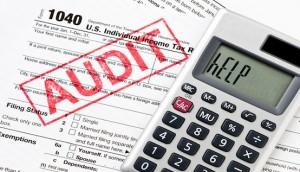 Nothing strikes fear in the hearts of taxpayers more than a tax audit from the IRS. While both the number of IRS agents and audits have declined by nearly 22 percent in the last five years due to budget cuts, the IRS still completed 1.2 million individual audits. According to the IRS commissioner John Koskinen, the reduced number of audits still generated over $10 billion in additional revenue for the IRS. Sure, the chances of being audited have declined over the last few years due to budget cuts. However, the circumstances below may increase the probability of the IRS targeting your return this year.
Nothing strikes fear in the hearts of taxpayers more than a tax audit from the IRS. While both the number of IRS agents and audits have declined by nearly 22 percent in the last five years due to budget cuts, the IRS still completed 1.2 million individual audits. According to the IRS commissioner John Koskinen, the reduced number of audits still generated over $10 billion in additional revenue for the IRS. Sure, the chances of being audited have declined over the last few years due to budget cuts. However, the circumstances below may increase the probability of the IRS targeting your return this year.
You are making too much
While most taxpayers would not complain about making more money, the fact is that your chances of receiving an audit letter increase exponentially with your level of income. For instance, in tax year 2014, taxpayers earning $200,000 or less only had .78 percent change of being audited – less than 1 percent. However, the audit rate increases to 2.71%, or one out of every 37 returns for income over $200,000. Your chance of being audited jumps to over 7.6 percent if you earned over $1 million or more. Bottom line – the more you earn, the more the IRS is going to give your return a closer look.
Careless errors
From an incorrect social security number to basic mathematical mistakes, typos and other careless errors can lead to further reviews of your return. Be sure to carefully check and then double-check your return to prevent these often overlooked errors that could draw unnecessary attention from the IRS.
Failing to report income from all sources
Today, the IRS receives copies of income you receive from outside sources such as your employer, financial institution and retirement plan and then cross-references it against the data you provide on your return. You can be sure that IRS may take notice of any inconsistencies or income that you fail to report from 1099s, W2s, etc. Consider maintaining complete records of all income sources and be sure that they are accurately accounted for on your return.
Excessive deductions
As you might imagine, the IRS leverages its vast taxpayer database to improve the efficiency of audits. By comparing your tax data to information from similar taxpayers at your income level, the IRS can identify any meaningful differences. For example, if you are claiming disproportionately high deductions as compared to your peers, you can bet that your return will stick out like a sore thumb, which could in-turn prompt the IRS to want to verify the data on your return. Home office deductions, rental property losses and the like should be reviewed carefully. While you should deduct everything that you are entitled to, be careful to maintain detailed records and be prepared to substantiate any excessively high deductions.
Disproportionately large charitable giving
Charitable contributions may allow you to reduce tax liability while also helping the charity of your choice. However, if you are making contributions that far exceed the average taxpayer at your income level, the chances of an audit may be greater. Do not allow the fear of an IRS audit letter prevent you from helping those in need though. Instead, take special care to document all charitable contributions according to IRS rules. Consider reviewing IRS Publication 526 - Charitable Contributions and Publication 561 - Determining the Value of Donated Property for more information.
Cash business
Owning a business within an industry known for its use of cash may increase the chances of your return being targeted for an audit. Hair salons, restaurants, laundromats, car washes and similar cash intensive businesses may all receive more scrutiny. Additionally, workers who receive a large portion of their income from tips should be especially careful. The IRS understands that the use of cash can lead to inaccuracies in the reporting of income and expenses so be sure to work closely with your accountant so that your numbers are accurate.
Deducting personal expenses on your business return
Deducting personal expenses as legitimate business expenses is yet another common audit red flag. While poor record keeping and the commingling of personal and business accounts can lead to inaccurate reporting, the IRS is on the look-out for taxpayers that attempt to “run” personal expenses through their business. From personal meals and entertainment to travel expenses and vehicles, the IRS will carefully review personal expenses that could be masked as legitimate business expenses. Be especially careful with the criteria for deducting an automobile for business use. Consider reviewing “Publication 463 — Travel, Entertainment, Gift and Car Expenses,” to ensure that you are properly deducting these expenses.
In the event you are targeted for an audit, review IRS Publication 556 - Examination of Returns, Appeal Rights and Claims for Refund for additional information on audit procedures. Since everyone’s tax situation is unique, consider speaking to your accountant to determine the appropriate approach for you.
Kurt J. Rossi, MBA, CFP®, CRPC®, AIF® is a CERTIFIED FINANCIAL PLANNERtm Practitioner & Wealth Advisor. He can be reached for questions at 732-280-7550, kurt.rossi@Independentwm.com, www.bringyourfinancestolife.com & www.Independentwm.com. LPL Financial Member FINRA/SIPC.








